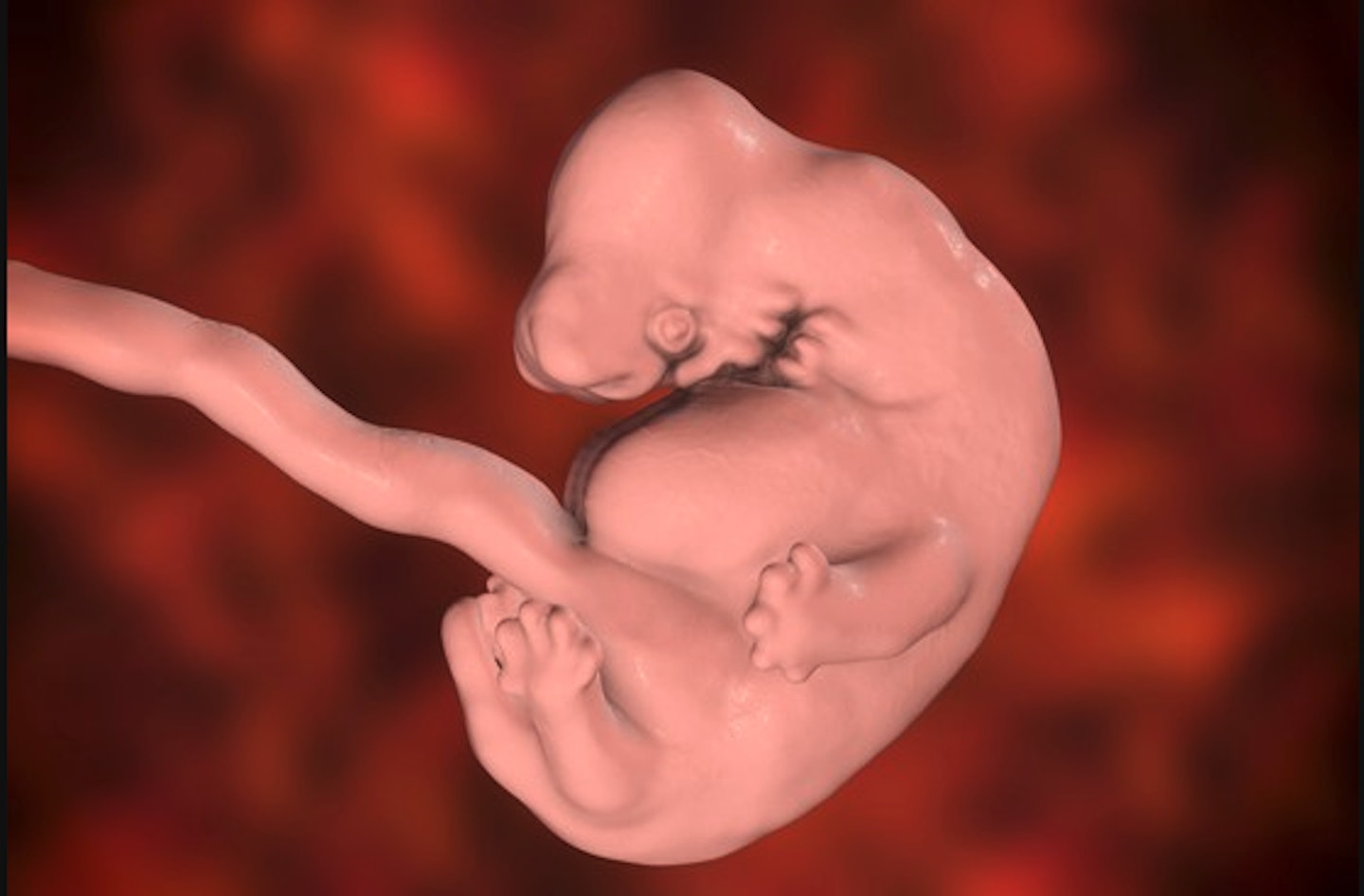Medically reviewed by Dr. Tiffany Pham
You've probably recently had a positive pregnancy test and are now coming to terms with your exciting news. Although you might not feel any symptoms at the minute, it's important to learn more about what is happening to your body right now, as the first trimester can be really tough on mums-to-be.
Now you are six weeks pregnant, here is your go-to guide on symptoms and what to expect.
Your baby at 6 weeks pregnant
"Baby is approximately 0.2in or 5-6mm on average," says Dr Pham. "This is about the size of a pea."
Your baby has been doing some serious growing over the past few weeks and will develop his or her face this week, doubling in size by next week. Fascinating, eh?
What's my baby doing at six weeks pregnant?
You might be feeling the full effects of those early pregnancy symptoms, but the good news is, "Certain body parts such as the nose, eyes, mouth and ears will start to form" explains Dr Pham.
The folds of tissue are developing that will soon become your baby’s face. At the moment, there are tiny openings that will turn into a mouth and nostrils in a few weeks. There are also dark patches that will eventually turn into eyes and small folds on the side of your baby’s head that will turn into ears.
"Four tiny limb buds that will eventually develop into the arms and legs are also beginning to take shape."
Your little tot's nervous system is developing from a neural plate – a layer of cells you can see on the 16th day of development. It forms a groove down the middle and the edges of the groove will curl up and meet to make the neural tube. The front bit of tube becomes the brain; the rest becomes the spinal cord. The spinal cord is also developing rapidly, but at the moment, it still resembles a tail.
"At this point they will also have a thin layer of skin that covers the entire body," adds Dr Pham.
The neural tube closes at four weeks. If it doesn't close, the baby develops a neural tube defect (such as spina bifida) or cleft lip or palate, where the roof of the mouth hasn’t fused together. Taking folic acid supplements can help protect your baby against these.
Your baby’s heart will also start to beat around 110 times (or higher) a minute and their heartbeat actually be seen (and/or heard) if you were to have an ultrasound this week.
Your baby's lungs, liver and kidneys are all beginning to develop too.
By the six-week mark, your baby will be joined to you through the umbilical cord, which will do the job of sending in food and getting rid of waste products.

Your body at 6 weeks pregnant
"Body changes and symptoms that occur in pregnancy can vary from person to person. While some people may experience these changes at this stage in their pregnancy, others may not, thus there is no expected “normal” but rather varying degrees of these changes may be present for some people," says Dr Pham.
Although you probably won’t look any different on the outside, you might be feeling queezy, bloated or craving foods you’ve never even wanted before.
Other early signs? You’ll probably need to pee a lot, especially when you’re trying to sleep. Luckily, this pressure will be relieved once your uterus rises at the beginning of trimester two. Although your constant need to wee might be annoying, do not stop drinking – your body needs it. Instead, lean forward on the toilet to ensure you’ve emptied your bladder each time.
The muscular band that sits at the top of your stomach relaxes due to increasing levels of pregnancy hormones. As your pregnancy progresses and the uterus continues to grow (this is more true in the 2nd and 3rd trimester), the muscular band relaxes even further as the growth of the uterus pushes against the stomach. Prior to pregnancy, the band acts to prevent digestive juices and contents of the stomach from backing up. The bad news is, during pregnancy with the relaxation of this muscular band, there is a very high chance you will experience heartburn. The good news is, you can minimise the symptoms by slowing down when you eat, so take your time!
Your uterus is getting bigger (no surprise there) but did you know that on average, the uterus can increase in weight from 70g to 1100g, this is about 500x the normal size. The greater volume of expansion may be dependent on the size of the baby or number of babies inside, the amount of amniotic fluid plus pathologic conditions such as fibroids within the uterus.
During these first few weeks of pregnancy, you’ll have an increased blood supply to your uterus (another reason why you need to wee so much!), breasts, kidneys and skin.
6 weeks pregnant symptoms
"You may experience changes to your breasts or nipples," says Dr Pham. "The breast may become more swollen or tender, and the nipples may darken in colour or become more prominent. These changes to the breast tissue help to prepare our bodies for breastfeeding."
Fatigue
"Fatigue can be a common symptom that you may experience throughout the first trimester of your pregnancy," says Dr Pham. "As levels of progesterone rise during pregnancy, it can contribute to the feeling of fatigue."
Your body is growing a baby, so it’s bound to be exhausted! Pay attention to your pregnancy fatigue and feel free to cancel those dinner arrangements and get an early night.
According to midwife and parenting expert Rachel Fitz-Desorgher, it's important to listen to our bodies.
"Listening to your body is the most important thing to do in early pregnancy - the weird symptoms are evolved to keep you and your tiny embryo safe. So respond to overwhelming fatigue by resting as much as possible in the evenings and at weekends rather than trying to 'carry on as normal'."

Nausea and vomiting
"HCG or human chorionic gonadotropin, is a hormone that is present in pregnancy. The increase in HCG levels can contribute to symptoms of nausea in pregnancy," says Dr Pham.
Whether you’re feeling a little sick at the sight of your partner’s scrambled eggs, or you’re throwing up your breakfast, lunch, and dinner, relax and remember, morning sickness is one of the most common signs of pregnancy. If you are still being sick, snacking is key.
Bloating
This one is down to the progesterone that’s flying around your body right now. Remember to eat lots of fibre and drink plenty of water to avoid getting constipated, which will only make that horrible bloated feeling worse.
Symptoms that may be abnormal or require contacting your GP or midwife can include:
•Severe or persistent abdominal cramping or pelvic pain
•Heavy vaginal bleeding (bleeding that is equivalent to a period or heavier, passing blood clots)
•Fever
•Changes to your vaginal discharge (watery, green/yellow in colour, discharge with an odour, clumpy thick discharge with itching or irritation etc)
•Severe or persistent vomiting
What to do at 6 weeks pregnant
• Register your pregnancy: Now is the time to contact your GP or a local midwife so you can arrange your booking appointment and discuss your antenatal care options. How you register will differ depending on where you live, some counties now allow you to self-refer to the hospital which involves filling out some online forms and they will then contact you to make your first midwife appointment. We recommend ringing your GP first who will then be able to tell you the best way to do this.
This appointment should happen before you are 10 weeks pregnant and will usually be done by a midwife. Your height and weight will be taken, your blood pressure measured. You might be asked to give a urine sample (which you probably won’t have a problem providing!) and have a blood test that will check your general health and blood group.
Another thing to expect is a lot of questions – so do your homework! Not only will they ask about your own health history, but also about your family's health history. Remember to make a list of questions for your midwife and ask them, no matter how silly they may sound.

• Listen to your body: "Being in tune with your body and listening to its needs will help you navigate your pregnancy journey," recommends Dr Pham. "If you are feeling more tired, let yourself take naps or sleep longer. If nausea or food aversions become a problem, eating smaller meals throughout the day and avoiding foods that are problematic may be helpful."
• Take folic acid: If you aren't already doing so, you should take 400 micrograms of folic acid every day throughout your pregnancy. This is to reduce the risk of problems in the baby's development in the early weeks of pregnancy. It is also advised to take a daily vitamin D supplement too. "You should also incorporate food sources that contain folate into your diet such as dark leafy green vegetables, fruit, seafood, beans, eggs, dairy products or meat and poultry," says Dr Pham.
• Share your news: "Don’t be too afraid to keep your happy news to yourself - you might well need more support and understanding right now, especially if you are having a rough time," says Rachel. "So let your boss, friends and family know sooner rather than later so that they can understand when you need that extra nap or snack break."
• Stop eating certain food: Now you're expecting, there are a few foods that are not safe in pregnancy. This includes foods made from unpasteurised milk, soft cheeses like brie and camembert (unless steaming hot), cold-cured meats and fish such as swordfish and raw shellfish.
• Eat healthily: You should be eating plenty of vegetables, grains, nuts and animal protein for the baby's development and your health.
• Drink plenty of water: Drinking several glasses of water will help relieve any digestive issues.
• Exercise: Although you might not feel like it, try and fit some exercise in – perhaps a gentle walk or a pregnancy yoga class. The endorphins will help you feel better and it might help you get to sleep.
A journalist since 2015, Emily Gilbert is the Features & Reviews Editor for Mother&Baby and has written for the website and previously the magazine for seven years. Emily writes about everything from the top baby products to pregnancy, fertility and maternal mental health. Specialising in product reviews, Emily is the first to know about all the exciting new releases in the parenting industry.
About the experts
Dr. Tiffany Pham is a board-certified obstetrician and gynaecologist and medical advisor for Flo Health, based in Houston, Texas. Pham is passionate about helping women get access to necessary health services and medically-accurate health information and better understand their bodies.
Rachel Fitz-Desorgher worked as a specialist midwife, infant feeding consultant and parenting consultant for over 30 years before deciding to leave midwifery in order to focus her expertise and experience on mentoring women transitioning from the busy world of work to motherhood.
